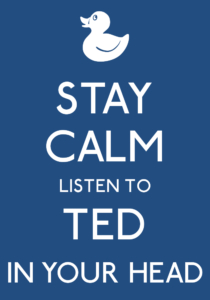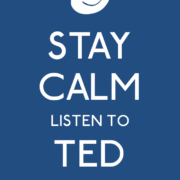Top 5 Things You Can Do Today to Lessen Your Anxiety – Episode 428
 (Want to hear the podcast on this topic? Go to TedinYourHead.com or tedmoreno.com/podcast)
(Want to hear the podcast on this topic? Go to TedinYourHead.com or tedmoreno.com/podcast)
As a hypnotherapist and anxiety specialist for 20 years, I’ve not only learned a lot about anxiety, but I’ve also seen things that I lot of people that have anxiety have in common.
Today we’re going to talk about 5 simple things you can do today to lessen your anxiety. First, let’s talk about what anxiety is.
According to the Mayo Clinic, anxiety is often described as sustained, excessive worry that a person cannot control related to the anticipation of a future threat, such as a traumatic event.
Generally, anxiety is your body’s natural response to stress. It’s a feeling in your body and mind of fear or worry. This can be caused by a few different factors ranging from genetics to the physiological state of your body to what’s happening in your environment.
Anxiety is your body’s fight/flight response getting activated. This is our protective defense mechanism which prepares us to literally run away or fight. It is both a physiological response as well as a psychological response.
If you have anxiety or your have experienced anxiety, you know the physical symptoms:
- Sweaty palm
- Shakiness
- Disorientation
- Shortness of breath
- A feeling of not being in your body,
- Increased heart rate
- Dizziness
- Pain in the chest or upset or pain in the stomach
These are just the physical symptoms. If you have chronic anxiety that’s been going on for a long time, then you might also experience a range of emotional issues as well, such as poor sleep, irritability, fatigue, excessive worry, and even panic attacks.
Chronic anxiety can get in the way of our ability to achieve our goals and live a life of peace and happiness. But even situational anxiety can be debilitating such as social anxiety test anxiety or driving anxiety for example.
The good news is that there are a few things you can start doing today that will help you with your anxiety. Here are 5 of the most important things that I’ve identified and recommend to my clients.
- When are feeling anxious our breathing tends to be short, quick and shallow. This means that your nervous system is what we call hypervigilant, or on the look for danger. You can shift your nervous system from fight or flight to rest and digest by taking some long slow deep breaths. Long and slow is the key here. Bring your attention into your body and focus on your breath. This will also help you get out of your head and get you some distance from the thing that is making you anxious. If you struggle with anxiety, I highly recommend that you go on YouTube and search for breathing exercises for anxiety and practice them daily. This could be a game changer for you.
- Practice Yoga. Yoga’s origins can be traced back to 5000 years ago. The word yoga means yoke or union, also sometimes interpreted as control, as you would control two oxen with a yoke. We’re talking here about bringing together the mind and body or as the ancient yoga texts from India suggest, union with the supreme. Yoga is a complex subject and there are many schools of yoga. What I’m referring to is what the Western world knows as Hatha yoga which is based on postures know as asanas, for physical fitness, stress-relief and relaxation. Personally, I can’t recommend yoga enough for overall mental and physical health. You can get a book, take a class, or watch videos. I’ve done it all, and my current yoga practice is a series of postures that I got from Instagram. Yoga can help you to get our of your head and into your body, so that you can deal directly with the physical symptoms of anxiety with greater control and a calmer mind.
- Eat Regularly. How you eat and what you eat can have a profound impact on how you feel. If you are skipping meals, you run the risk of episodes of low blood sugar. Do you ever feel “hangry” when you haven’t eaten? It’s when you are hungry and angry and irritable because your blood sugar is low. But low blood sugar (blood glucose) because you haven’t eaten in a while can trigger anxiety. Many phobias start as episodes of low blood sugar. For instance, say you are getting on an airplane. You didn’t get much sleep last night because you were packing, so you were rushing around in the morning trying to get to the airport, so you skip breakfast. When you get to the airport, you gulp down some coffee and a donut and the Dunkin Donut franchise. This spikes your blood sugar. So, you’re sitting on the airplane when your body says, “Whoa, too much blood sugar!” When your blood sugar drops as your body tries to bring it down, this triggers anxiety. Now you associate that anxiety with being on an airplane (or elevator, or in a car, or driving over a bridge, etc.) and now you have fear of flying. So I recommend that you eat three meals a day with protein, avoid high carb meals, and if you think caffeine is making you nervous, then it probably is. Cut down or cut it out completely. Alcohol can also increase anxiety, so try cutting down or stopping completely and see how you feel.
- Get More Sleep. Your mind is like a cup. You can only fill a cup with so much before it starts running over and you have a big mess. Your mind is the same way. It has a certain capacity. All the stresses and issues and problems fill up your mind. At night when you are sleeping, one of the jobs that your mind has is to empty the cup. Take out the trash, so to speak. If you are not getting enough sleep, which is 8 hours for adults, then your mind is not getting the release it needs. That’s when we start to feel overwhelmed because there’s too much going on in the mind. Overwhelm can trigger anxiety. Check out my podcast episode 419, How to Stay Out of the Bad Kind of Hypnosis.
- Positive Self Talk. Also known as thought reframing, this is where you practice talking to yourself in a way that you are not scaring the poop out of yourself if you know what I mean. Essentially, you are training your mind to focus on what will go right, what you can overcome and how you want it to be, as opposed to the thought of worry and fear. We can get into the habit of catastrophic thinking, doom and gloom expectation and a pessimistic outlook. This can be changed.
For instance, if you are spending a lot of time in the “What If Pit” such as “What if this bad thing happens!” you can ask yourself “Well, what if something good thing happens?” Or you can reason with yourself and say, “I don’t know what’s going to happen, so it makes no sense to get scared or worried about something that hasn’t happened yet.” If you practice this type of self-talk or thought reframing, you’ll get better at it and it will become a new habit that can help you feel a lot more calm and at ease.
Want to catch up on previous episodes? Click here >
So there you go. I hope that’s helpful to you. Of course, if you want to explore hypnotherapy to help with anxiety, which can be very effective by the way, feel free to request a complimentary phone consultation by going to tedmoreno.com/contact-us.
As always, I’ll leave you with a quote by Kahlil Gibran: “Our anxiety does not come from thinking about the future, but from wanting to control it.”
Ted



